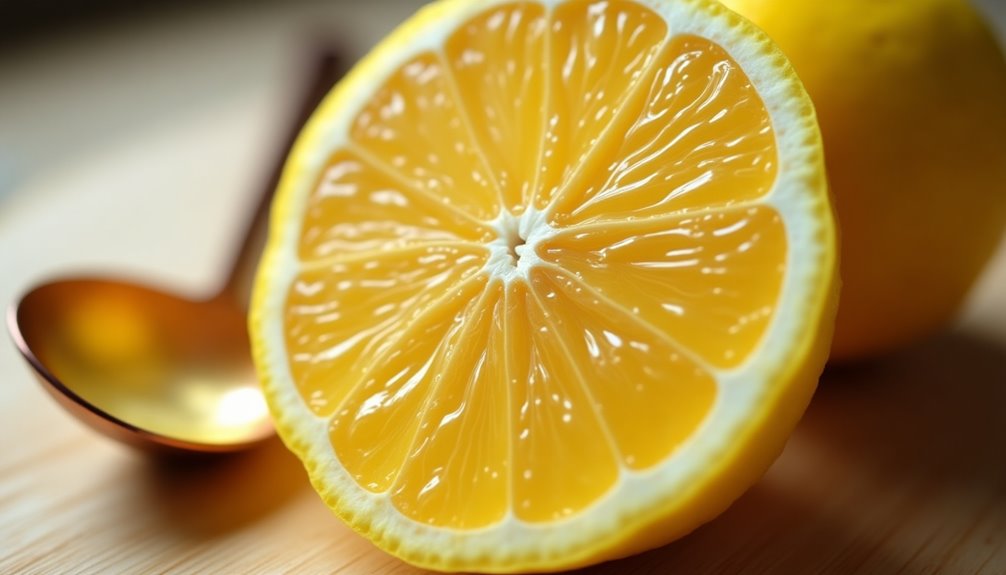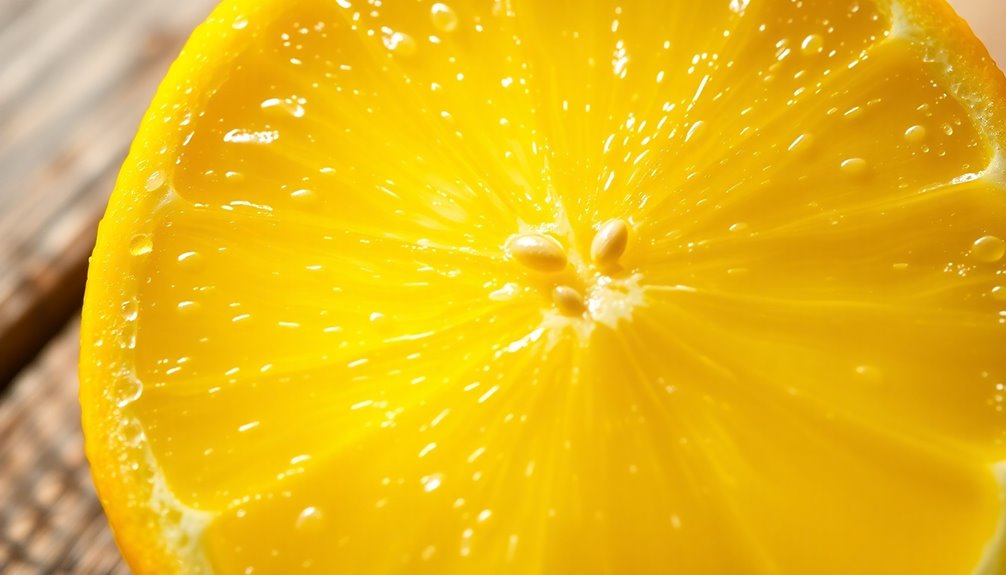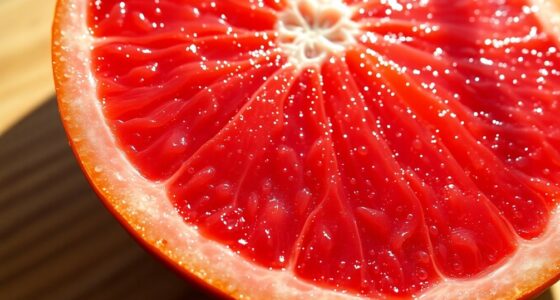Half a medium lemon yields about 1.5 tablespoons of juice, while a large lemon can give you around 2 tablespoons. The juice amount can vary depending on the lemon's size and ripeness, so it's good to keep that in mind. If you find you're not getting enough juice, consider using larger lemons or combining halves for more yield. Want to know how to maximize juice extraction? There's more to explore!
Key Takeaways
- Half a medium lemon yields approximately 1.5 tablespoons of juice.
- Half of a large lemon typically produces around 2 tablespoons of juice.
- Juice yield can vary based on lemon size and ripeness.
- Techniques like warming and rolling the lemon can maximize juice extraction.
- For insufficient juice, consider using a larger lemon or combining halves.

When you're cooking or mixing drinks, knowing exactly how much juice you can get from half a lemon is key. It can make a big difference in your recipes, especially when those tangy flavors are essential for achieving the perfect balance. Generally, half a medium lemon will yield about 1.5 tablespoons of juice. However, if you've got a large lemon, you can expect to get approximately 2 tablespoons from that same half. This can be crucial when you're following a recipe that requires precise measurements.
Understanding the juice yield from a lemon can be a bit tricky, as it varies based on size and ripeness. Smaller lemons may yield less juice, while larger, riper ones can provide more. It's always a good idea to measure the juice, especially if you're aiming for consistency in your cooking or cocktail-making. If you're in a pinch, you might want to consider having a variety of lemons on hand to ensure you get the right amount of juice for your needs.
To maximize the juice extraction from half a lemon, there are a couple of tricks you can try. One effective method is to warm the lemon slightly before cutting it. Heat can help break down the internal membranes, making it easier to extract juice. You can simply microwave the lemon for about 10-15 seconds or leave it in a warm spot for a few minutes.
Additionally, rolling the lemon on a hard surface before cutting can also help. This action breaks down the internal structure, allowing more juice to flow out when you squeeze it.
When you're ready to measure the juice, cut the lemon in half and squeeze it over a measuring spoon or cup. If you're using a citrus juicer, be sure to press down firmly to get the most juice possible. Remember, the goal is to extract every last drop, especially if your recipe calls for a specific amount.
If you find you're not getting enough juice from half a medium lemon, you may need to adjust your strategy. You might want to grab a larger lemon or combine it with another half if you need a bit more.
Frequently Asked Questions
How Much Bottled Lemon Juice Equals Half a Lemon?
When you're looking to substitute bottled lemon juice for half a lemon, about 0.75 ounces should do the trick.
That's roughly equivalent to 1.5 tablespoons of bottled lemon juice.
Keep in mind that different brands might vary in strength, so it's always best to check the label.
Using this measurement, you can achieve a similar flavor in your recipes without the fuss of squeezing a fresh lemon.
Can I Substitute Bottled Lemon Juice for Fresh Lemon Juice?
You can substitute bottled lemon juice for fresh lemon juice, but keep in mind that the flavor might differ.
Fresh juice offers a vibrant taste that bottled juice often lacks due to preservatives.
If you're using it in recipes where flavor is crucial, like cocktails or dressings, it's best to stick with fresh.
Always taste-test your dish after substituting to ensure you get the right acidity and flavor balance you want.
How Much Real Lemon Is Equal to the Juice of One Lemon?
When you're trying to find out how much real lemon equals the juice of one lemon, it's good to know that a typical medium lemon yields about 3 tablespoons of juice.
If you're using bottled lemon juice, remember that it's often concentrated, so you'll need slightly less.
Always taste as you go to achieve the best flavor, adjusting the amount based on your recipe and personal preference for tartness.
How Many Drops of Lemon Juice Do You Get From Half a Lemon?
When you squeeze half a lemon, you'll likely get around 22.5 drops of juice, assuming it's a medium-sized lemon.
This can vary based on how juicy the lemon is and how effectively you squeeze it. If you want a more precise measurement, using a dropper can help.
Keep in mind that the size and ripeness of the lemon might also affect the total number of drops you get.
Conclusion
In conclusion, half a lemon typically yields about 1 to 2 tablespoons of juice, perfect for adding a zesty kick to your dishes or drinks. So, next time you’re whipping up a recipe, don’t hesitate to squeeze that citrus goodness! Just like a knight in shining armor wouldn’t shy away from a dragon, you shouldn’t shy away from enhancing your culinary creations. Now go ahead and elevate your meals with that fresh lemon juice! Moreover, you might be surprised to discover just how much juice in half lemon can transform a mundane dish into something extraordinary. Whether you’re drizzling it over fresh seafood, mixing it into salad dressings, or using it to brighten up desserts, that little squeeze can make a world of difference. So remember, the next time you find yourself asking how much juice in half lemon, you’ll know that it’s a small but mighty ingredient that deserves a spot in your kitchen arsenal!
Cindy thoroughly researches juicing trends, techniques, and recipes to provide readers with practical advice and inspiration. Her writing style is accessible, engaging, and designed to make complex concepts easy to understand. Cindy’s dedication to promoting the advantages of juicing shines through her work, empowering readers to make positive changes in their lives through the simple act of juicing.

















